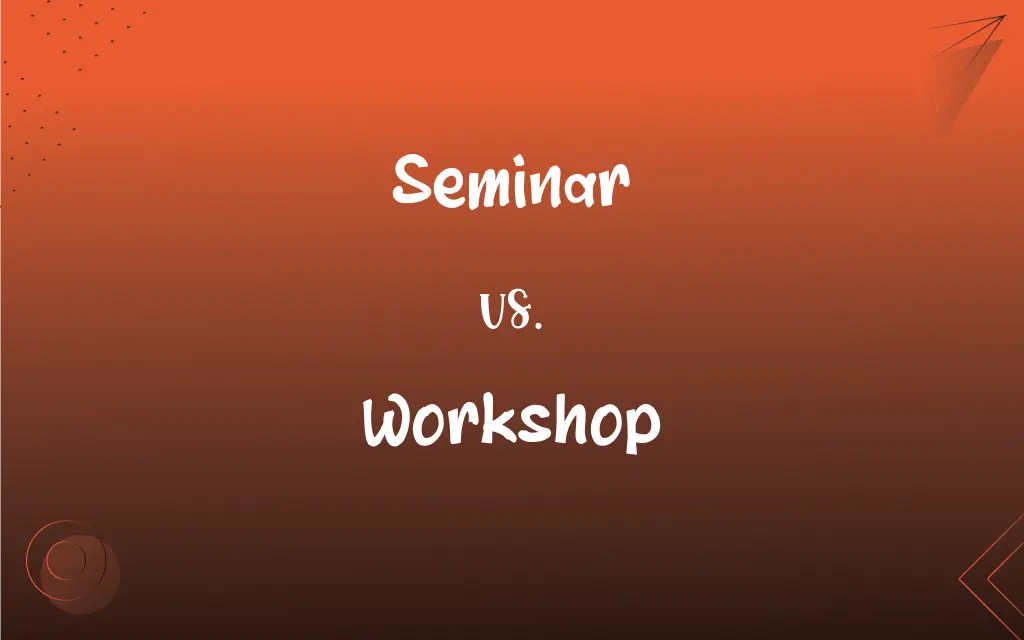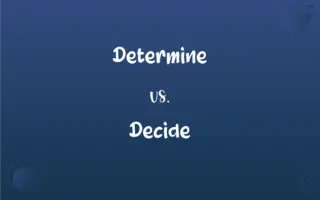Seminar vs. Workshop: What's the Difference?
Edited by Harlon Moss || By Janet White || Updated on October 4, 2023
A seminar typically involves an expert-led presentation to share knowledge, whereas a workshop emphasizes hands-on learning and practical activities.

Key Differences
Seminars tend to revolve around the dissemination of information, where one or several experts present data, research, or theories to an audience. Contrarily, workshops lean towards activity-based interaction, where participants are expected to engage actively in practical tasks. The seminar environment primarily supports a one-to-many communication model, while the workshop creates a more interactive, participative space.
In a seminar, participants mainly listen, take notes, and may engage in discussions. In workshops, participants might break into groups, engage in practical exercises, and produce a tangible outcome or skill. The setting of a seminar is generally formal and structured, usually involving a pre-determined agenda and material, while workshops might follow a more flexible, adaptive schedule based on the progression of hands-on activities.
Seminars often emphasize theoretical knowledge, providing insights based on studies, observations, or expert views on a subject matter. In contrast, workshops pivot towards skill development, concentrating on applying knowledge through practical exercises, simulations, or scenario-based learning. The level of participant interaction in seminars is frequently limited to Q&A sessions or panel discussions, unlike workshops where interaction forms the core of the activity.
The evaluation of understanding in a seminar is typically indirect and may be gauged through participant feedback or a post-seminar test. Workshops may have a more direct and immediate evaluation approach, as facilitators can observe participant engagement, application of skills, and project outcomes. Seminars can be seen as more lecture-based, predominantly imparting knowledge, whereas workshops are often exploratory, involving the active participation of attendees.
Seminars may be utilized to introduce new concepts, present research findings, or share industry insights with the aim to inform and educate attendees. Workshops, alternatively, might be employed to build capacities, enhance skills, or facilitate the collaborative development of ideas and solutions. A seminar might be perceived as more of an academic or professional lecture, while a workshop can be understood as a practical lab or a collaborative work session.
ADVERTISEMENT
Comparison Chart
Primary Focus
Information dissemination and presentation
Hands-on activities and practical learning
Participant Role
Primarily listeners and note-takers
Active participants and collaborators
Interaction
Limited, often through Q&A sessions
High, with frequent group activities and sharing
Content Type
Theoretical, data-driven, research-oriented
Practical, skill-oriented, activity-based
Outcome
Knowledge acquisition
Skill development and practical application
ADVERTISEMENT
Seminar and Workshop Definitions
Seminar
A structured presentation or lecture focused on a particular subject.
The health seminar aimed to raise awareness about mental well-being.
Workshop
A structured, interactive meeting focused on skill or capability enhancement.
The writing workshop helped students enhance their creative writing abilities.
Seminar
A meeting for disseminating and discussing specialized knowledge.
The scientist delivered a groundbreaking seminar on renewable energy technologies.
Workshop
A practical session aimed at creating, building, or developing something specific.
The robotics workshop allowed students to build their own robots.
Seminar
A professional gathering for discussing industry trends.
The marketing seminar provided insights into upcoming digital strategies.
Workshop
A session where participants work on practical tasks or projects.
The workshop focused on developing hands-on engineering skills.
Seminar
An academic forum for exploring a specific topic.
Students must attend a seminar series as part of the course curriculum.
Workshop
A facilitator-led meeting where participants actively explore a subject or skill.
The photography workshop took participants on field trips for practical experience.
Seminar
A course of study for a small group of students in a college or graduate school, often entailing research under the guidance of a professor.
Workshop
A room, area, or small establishment where manual or light industrial work is done.
Seminar
The group of students in such a course.
Workshop
An educational seminar or series of meetings emphasizing interaction and exchange of information among a usually small number of participants
A creative writing workshop.
Seminar
A scheduled meeting of such a group.
Workshop
To create or revise (a drama or literary work) based on suggestions or criticism from a group of collaborators.
Seminar
A meeting for an exchange of ideas; a conference.
Workshop
A room, especially one which is not particularly large, used for manufacturing or other light industrial work.
Seminar
A class held for advanced studies in which students meet regularly to discuss original research, under the guidance of a professor.
Workshop
A brief, intensive course of education for a small group, emphasizing interaction and practical problem solving.
Seminar
A meeting held for the exchange of useful information by members of a common business community.
Workshop
An academic conference.
Seminar
A group of students engaged, under the guidance of an instructor, in original research in a particular line of study, and in the exposition of the results by theses, lectures, etc.; - formerly called also seminary, now seldom used in this sense.
Workshop
(transitive) To help a playwright revise a draft of (a play) by rehearsing it with actors and critiquing the results.
Seminar
Any meeting for an exchange of ideas
Workshop
(transitive) To work on or revise something, especially collaboratively, in a workshop.
Seminar
A course offered for a small group of advanced students
Workshop
To improve through collaboration.
Seminar
A convention of experts and enthusiasts to discuss specific topics.
The international seminar drew experts from various countries.
Workshop
A shop where any manufacture or handiwork is carried on.
Workshop
Small workplace where handcrafts or manufacturing are done
Workshop
A brief intensive course for a small group; emphasizes problem solving
Workshop
An event that encourages collaborative work and interactive participation.
The innovation workshop gathered ideas from employees across various departments.
FAQs
How is a Workshop typically structured?
Workshops are typically structured around interactive activities and practical sessions designed to develop specific skills or create something.
Are workshops more hands-on than seminars?
Yes, workshops generally emphasize hands-on learning and active participation much more than seminars.
Can Seminars be interactive?
Yes, seminars can have interactive elements like Q&A sessions, discussions, and panels but are often less interactive than workshops.
Are Seminars more formal than Workshops?
Seminars tend to be more formal and lecture-based, whereas workshops might have a more informal, collaborative atmosphere.
Can a Seminar be conducted virtually?
Yes, seminars can be conducted virtually, with presentations and discussions facilitated through online platforms.
Do I need specialized knowledge to attend a Seminar?
Not always. Seminars can be for experts or novices, depending on the topic and intended audience.
Is attendance at Seminars and Workshops typically free?
Both can be free or paid, depending on the organizer, topic, speaker, and resources provided.
Can a Seminar evolve into a Workshop?
Yes, a seminar can transition into a workshop, particularly if a presentation or discussion leads to practical, interactive activities.
How does participant involvement differ between Seminars and Workshops?
Participants in seminars primarily listen and may engage in discussions, while in workshops they actively participate, often engaging in practical tasks or group work.
What types of skills are typically developed in Workshops?
Workshops often focus on developing practical, applicable skills, such as writing, building, creating, or other hands-on abilities.
Are Workshops typically longer than Seminars?
The length can vary for both, but workshops might be longer due to the interactive, practical activities involved.
What is the primary aim of a Seminar?
The primary aim of a seminar is usually to disseminate information or knowledge to attendees through presentations or discussions.
How are outcomes evaluated in Workshops?
Outcomes from workshops might be evaluated through observing application of skills, participant feedback, or reviewing created projects.
What materials are typically needed for Seminars and Workshops?
Seminars may require presentation materials, while workshops might need resources for practical activities, such as writing materials, building tools, or creative supplies.
Can anyone host a Workshop or Seminar?
While anyone can host, successful workshops and seminars are typically led by individuals or organizations with expertise or experience in the topic discussed.
How does the facilitator’s role differ in Seminars and Workshops?
In seminars, facilitators often present or moderate discussions, while in workshops they guide practical activities and ensure active participation.
Can Workshops and Seminars be part of a larger event?
Yes, workshops and seminars can be standalone events or part of larger conferences, courses, or conventions.
What is the expected attire for Seminars and Workshops?
Attire can depend on the event’s formality and industry; business or casual attire is common for seminars, while comfortable, practical clothing might be preferred for workshops.
Are workshops always subject-specific?
Workshops are usually focused on a particular subject or skill, providing hands-on experience or active exploration of the topic.
How are Seminars and Workshops typically advertised?
Both might be promoted through various channels like websites, email newsletters, social media, or academic and professional networks.
About Author
Written by
Janet WhiteJanet White has been an esteemed writer and blogger for Difference Wiki. Holding a Master's degree in Science and Medical Journalism from the prestigious Boston University, she has consistently demonstrated her expertise and passion for her field. When she's not immersed in her work, Janet relishes her time exercising, delving into a good book, and cherishing moments with friends and family.
Edited by
Harlon MossHarlon is a seasoned quality moderator and accomplished content writer for Difference Wiki. An alumnus of the prestigious University of California, he earned his degree in Computer Science. Leveraging his academic background, Harlon brings a meticulous and informed perspective to his work, ensuring content accuracy and excellence.
































































